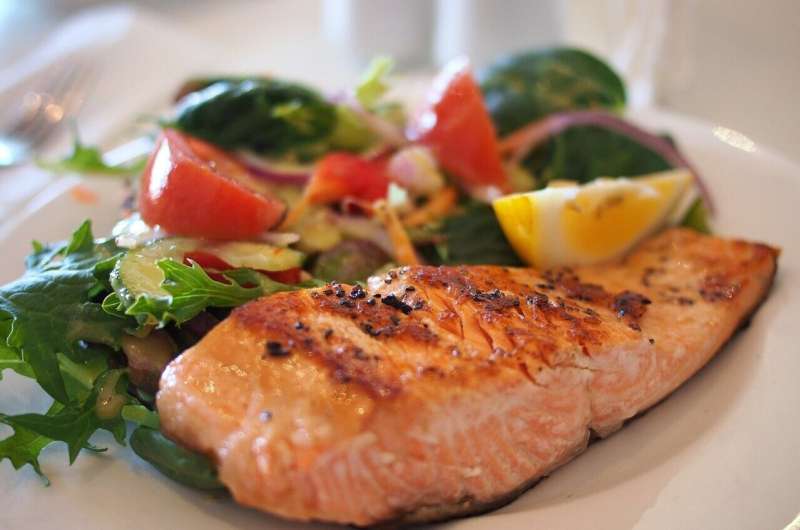This article has been reviewed according to Science X's editorial process and policies. Editors have highlighted the following attributes while ensuring the content's credibility:
fact-checked
peer-reviewed publication
proofread
Pesco-vegetarian diets best for reducing risk of death in elderly, research suggests

A variety of vegetarian diets appear to protect against risk of mortality and contributing conditions, with a pesco-vegetarian diet—which includes fish—providing the most protection against risk in very elderly people, according to a new study.
The study, "Cause-specific and all-cause mortalities in vegetarian compared to non-vegetarian participants from the Adventist Health Study-2 cohort," was published August 2 in the American Journal of Clinical Nutrition.
Researchers at Loma Linda University Health found that vegetarian diets are associated with lower risk for all-cause mortality and many cause-specific mortalities, especially among males and in middle-aged subjects. However, slightly higher risks were observed among very elderly vegetarians for neurological conditions such as stroke, dementia, and Parkinson's Disease.
Despite this, the pesco-vegetarian diet continued to offer a small but noticeable advantage over other vegetarian and non-vegetarian diets, even in elderly people.
Gary Fraser, MBCHB, Ph.D., distinguished professor at Loma Linda University School of Public Health and principal investigator of the study, said a vegetarian diet appears to offer protection from risk of death through middle-aged years, but once it helps people get into their 80s, that overall advantage seems to disappear for those adhering to a strict vegetarian diet.
"These increased risks of neurological conditions among vegetarians in their 80s weren't huge, but something is going on there that we shouldn't ignore if we wish the vegetarian advantage to continue for all vegetarians in their later years," Fraser said.
The study used data from the Adventist Health Study-2, a massive cohort of nearly 96,000 people who identify as Seventh-day Adventist and lived in the United States and Canada during the study's baseline recruitment between 2002 and 2007, with follow-up through 2015. Data from that group has been used for numerous studies on health, disease, and mortality over the years.
This study analyzed data from more than 88,000 subjects and approximately 12,500 deaths in the study cohort. Dietary data were collected using a questionnaire and then categorized into five patterns: non-vegetarian, semi-vegetarian, pesco-vegetarian, lacto-ovo-vegetarian, and vegan.
Fraser said his team found that Adventist vegetarians overall had about a 12% less risk of death compared to Adventist non-vegetarians. Study participants with a pesco-vegetarian diet had an 18% less risk of death.
Those with a lacto-ovo-vegetarian diet (including dairy and eggs) had a 15% less risk of death. Vegans overall had a less than 3% decreased risk of death, but male vegans fared much better than non-vegetarians, in contrast to females.
"Overall, this is some of the clearest data that American vegetarians are greater protected from premature death than non-vegetarians," Fraser said.
More information: Grace P Abris et al, Cause-specific and all-cause mortalities in vegetarian compared with those in nonvegetarian participants from the Adventist Health Study-2 cohort, The American Journal of Clinical Nutrition (2024). DOI: 10.1016/j.ajcnut.2024.07.028




















